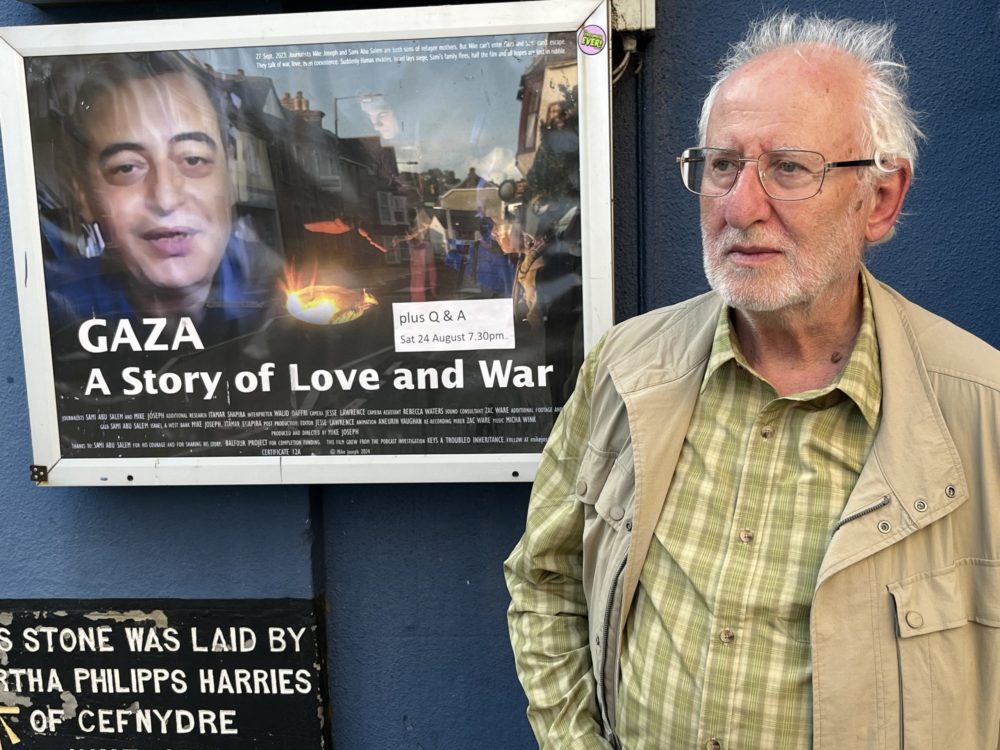Welsh-Palestinian film on Gaza War has successful premiere

Martin Shipton
A pioneering film collaboration between a Jewish journalist from Wales and a Palestinian journalist based in Gaza received an enthusiastic reception at its Welsh premiere in Fishguard.
Gaza: A Story of Love and War is a documentary that arose out of a podcast series produced by Cardiff-born Mike Joseph that links the Jewish Holocaust with the Palestinian Nakba.
The film contains conversations between Joseph and Palestinian journalist Sami Abu Salem together with footage shot during the invasion of Gaza by the Israeli Defence Forces.
The men talk about their respective family histories. Dozens of Joseph’s relatives were murdered by the Nazis, while Salem’s family was driven out of their village, Burayr, in 1948 by a Jewish militia, which included an uncle of Joseph, that killed about 125 farmers and their families by throwing hand grenades at them in their homes.
Discussing 10 days before Hamas’ attack on Israel in October 2023 whether co-existence was possible between Arabs and Jews, the men agreed that it was, so long as debate about the conflict wasn’t dominated by “extremist” media coverage.
The second half of the film tells how the lives of Salem and his family have been devastated by the Israeli invasion. By the time it ends, their home had been destroyed and they had already been dislocated eight times.
Speaking at a Q&A that followed the screening, Joseph said: “At that point he has survived, his family have survived, but they have had to pack their bags and flee eight times in the course of half that many months.”
Silence
Asked what had happened to Salem since, Joseph said: “For many months after the final audio reports, there was silence from Sami. The silence started at the time that Sami clearly had to make a choice about whether to stay in Rafah [to which hundreds of thousands of Gazans were forced to flee by the Israelis] or to leave, and if so where to go.
“I did receive audio reports from him about three weeks later. He had left Rafah and was now in a tent somewhere on the coastal strip – the sand dunes where there’s no water and nothing, basically. And then silence for many, many weeks, during which I knew he was still alive because his WhatsApp feed was being attended to on a regular basis, but there were no responses to any of my reports to him about how this film production was developing.
“So I feared the worst, but didn’t know how to interpret it. And then I finally got through to him in a call and he explained he had not responded because he has nothing to say. And for a journalist who had maintained the flow of personal reporting from the middle of this crisis, for him to say he has nothing to say signalled something catastrophic. And he went on, and he elaborated on that in the following few days, sending further reports, one of which really shocked me.

“His family are still alive. His children look at him now with different eyes. They have always been used to seeing him as a ‘superman’ or father, who is supposed to be able to work miracles.
“And they’re looking at him saying, ‘why is this happening – why hasn’t he saved us, protected us? So he is facing the loss of respect of his children, and he then finished his comments by saying: ‘Mike – please get us out of here. Please get me out. And if not me, then at least my children’.
“Now you might say, ‘well yes of course, what took him so long?’ But remember what he said in the film: “How could anyone persuade me not to long to return to my mother’s home in Burayr? If we leave, we will never come back.’
“And he has now lost his voice, and he’s lost his hope of return. I would say there’s something at a very personal level which is very relevant indeed to the whole big question of is this genocide, And that is that if you look at the legal definition of the commission of genocide, it includes not simply killing people; it also means destroying the means to survive, the means to live in all the ways that we do live. And in the case of Sami, the Israel attack has destroyed his will to remain.”
A July 2024 count by the Gaza government media office placed the number of Palestinian journalists killed during the current war at 160.
Audience members described the film as desperately sad but inspirational. It is due to be shown at other cinemas in Wales, as well as in Finchley, a north London suburb with a large Jewish population where Joseph expects supporters of the Israeli government to attend.
On September 3,4 and 5 the film will be shown at Wyeside Arts Centre, Builth Wells, with a Q&A on September 4.
On September 8 it will be shown at the Phoenix Cinema, East Finchley, followed by a Q&A.
On September 20, 21, 22 and 26, it will be shown at Theatr Mwldan, Cardigan, with a Q&A on September 20.
Support our Nation today
For the price of a cup of coffee a month you can help us create an independent, not-for-profit, national news service for the people of Wales, by the people of Wales.






Thanks for this, we will be going to the screening in Aberteifi, and I have informed friends in London about its screening there.